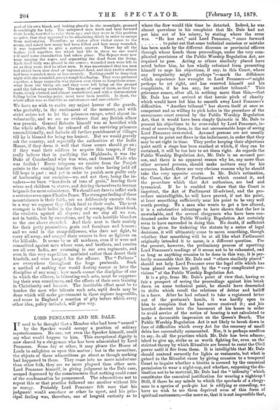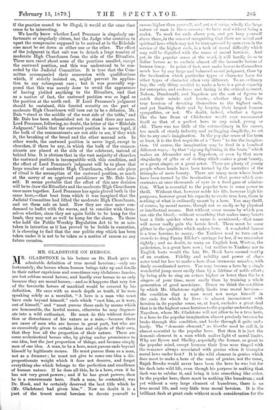LORD PENZANCE AND MR. DALE.
IT used to be thought that a Member who had been "named" by the Speaker would occupy a position of solitary mysteriousness. No one, not even the Speaker himself, could say what would happen to him. This exceptional dignity is now shared by a clergyman who has been admonished by Lord Penzance. Some day or other, it may please the House of Lords to enlighten us upon this matter ; but in the meantime, the objects of these admonitions go about as though nothing had happened to them. They come into no more misfortune than other folk, they are no more plagued than other men. Lord Penzance himself, in giving judgment in the Dale case, seemed depressed by the consciousness that nothing could come of the condemnation he pronounced. The admonitions not to repeat this or that practice followed one another without life or energy. Probably Lord Penzance felt sure that his judgment would somehow or other be upset, and his prin- cipal feeling was, therefore, one of languid curiosity as to where the flaw would this time be detected. Indeed, he was. almost querulous in his complaint that Mr. Dale had not put him out of his misery, by stating where the error was. "He has not," said Lord Penzance, " come forward to point out that some technical omission or mistake has been made by the different diocesan or provincial officers through whose hands these proceedings, under the very com- plicated provisions of the Public Worship Regulation Act, are required to pass. Acting as others similarly placed have acted before him, he has wholly refrained from presenting himself to urge his objections, if any, in this Court, where any irregularity might perhaps "—mark the diffidence which experience has wrought in Lord Penzance—" might perhaps be set right, and has reserved himself and his complaints, if he has any, for another tribunal." This grievance comes, after all, to nothing more than this,—that Mr. Dale has not arrived at that heroic pitch of charity which would have led him to smooth away Lord Penzance's difficulties. " Another tribunal" has shown itself at once so competent and so willing to pick holes in the procedure of the anonymous court created by the Public Worship Regulation Act, that it would have been simply Quixotic in Mr. Dale to present his objections to be over-ruled by Lord Penzance, in- stead of reserving them, in the not unreasonable -hope of seeing Lord Penzance over-ruled. Accused persons are not usually expected to point out flaws in the indictment, in order that they may be set right in time. They prefer keeping their objections quiet until a stage has been reached at which, if they can be sustained, it will be too late to set them right. As regards the Public Worship Regulation Act, Mr. Dale is an accused per- son, and there is no apparent reason why he, any more than other accused persons, should make matters easy for his accusers. Indeed, there are very obvious reasons why he should take the very opposite course. In Mr. Dale's estimation, the Court, the Act of Parliament which created it, and the procedure which that Act authorises, are bad and tyrannical. If he is enabled to show that the Court is impotent, the Act of Parliament ill-advised, and the pro- cedure unintelligible, he will have proved, if not his point, at least something sufficiently near his point to be very well worth proving. To a man who wants to get a law altered, it is a substantive advantage to have shown that the law is unworkable, and the several clergymen who have been con- demned under the Public Worship Regulation Act certainly seem to have succeeded in doing this. No doubt, if sufficient time is given for tinkering the statute by a series of legal decisions, it will ultimately come to mean something, though whether that something will be at all like what Parliament originally intended it to mean, is a different question. For the present, however, the preliminary process of upsetting Lord Penzance's readings of it seems not to be exhausted, and so long as anything remains to be done in this way, it is per- fectly reasonable that Mr. Dale and "others similarly placed" should not help Lord Penzance over the legal stile which has been placed across his path by the " very complicated pro- visions " of the Public Worship Regulation Act.
It is a pity, from Mr. Dale's point of view that, having so fair a prospect of seeing the proceedings against him break down on some technical point, he should have descended to shifts which recall the relations of debtor and bailiff in a farce. After he had refused to take a registered letter out of the postman's hands, it was hardly open to him to complain that he had never received it ; and his hurried descent into the basement of his house in order to avoid service of the notice of hearing is not calculated to make a favourable impression on the Queen's Bench. The Public Worship Regulation Act is not likely to break down in face of difficulties which every Act for the recovery of small debts has successfully surmounted. Nor, it is perhaps needless to say, do all the practices which Mr. Dale has been admon- ished to give up, strike us as worth fighting for, even on the strictest theory by which Ritualists are bound to resist the Civil power until it flee from them. It is intelligible that Mr. Dale should contend earnestly for lights or vestments, but what is gained to the Ritualist cause by giving occasion to a temporal Court to inquire whether a biretta is covered by the canonical permission to wear a night-cap, and whether, supposing the dis- tinction not to be material, Mr. Dale had the " infirmity " which constitutes the canonical justification for wearing a nightcap ? Still, if there be any minds to which the spectacle of a clergy- man in a species of pork-pie hat is edifying or consoling, we have no wish to see them deprived even of this form of spiritual sustenance,—the more so, that it is not impossible that,
if the practice ceased to be illegal, it would at the same time cease to be interesting.
We hardly know whether Lord Penzance is singularly un- fortunate or singularly obtuse, but the Judge who contrives to upset the compromise supposed to be arrived at in the Ridsdale case must be set down as either one or the other. The effect of the judgment in that suit was to detach a large number of moderate High Churchmen from the side of the Ritualists. These men cared about none of the practices assailed, except the eastward position, and this was understood to be con- ceded by the Judicial Committee. It is true that the Com- mittee accompanied their concession with qualifications which, if strictly insisted on, might prevent its applica- tion to any subsequent case ; but it was generally sup- posed that this was merely dune to avoid the appearance of having yielded anything to the Ritualists, and that as a matter of fact, the eastward position was as legal as the position at the north end. If Lord Penzance's judgment should be sustained, this fancied security on the part of moderate High Churchmen will turn out to be a delusion. Mr. Dale " stood at the middle of the west side of the table," and Mr. Dale has been admonished not to stand there any more. Lord Penzance, following, no doubt, the letter of the " Ridsdale Judgment," holds that the eastward position is never legal, if the bulk of the communicants are not able to see, if they wish it, the breaking of the bread and the other manual acts. In other words, the eastward position is never legal, except in churches, if there be any, in which the bulk of the commu- nicants are placed at the side of the celebrant, instead of behind him. It is obvious that in the vast majority of churches the eastward position is incompatible with this condition, and the effect of Lord Penzance's judgment will be to place that large number of moderate High Churchmen, whose sole piece of ritual is the assumption of the eastward position, as much at the mercy of an aggrieved parishioner as Mr. Dale him- self. It seems probable that the effect of this new decision will be to draw the Ritualists and the moderate High Churchmen once more together. Lord Penzance has again placed both in the same boat,—that boat from which it was imagined that the Judicial Committee had lifted the moderate High Churchmen, and set them safe on land. Now they are once more con- demned to buffet with the waves, and to consider with them- selves whether, since they are again liable to be hung for the lamb, they may not as well be hung for the sheep. To those who hold the Public Worship Regulation Act to be as mis- taken in intention as it has proved to be feeble in execution, it is cheering to find that the one politic step which has been taken under it is not to be taken as a matter of course on any future occasion.



































 Previous page
Previous page